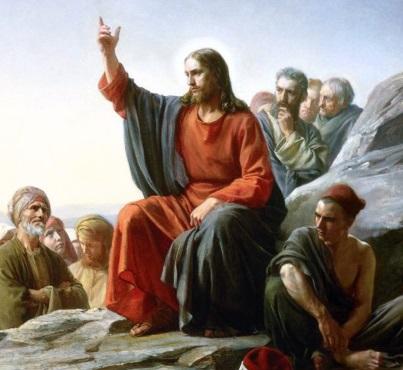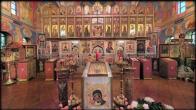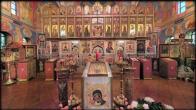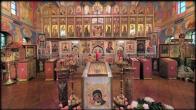You are here
Blessed are they that hunger and thirst after righteousness

We hardly think about the daily bread that we eat to keep up our strength. But the hungry man thinks about bread constantly; he seeks it everywhere. A man fainting from thirst feels himself ready to trade anything for a cold glass of water, to pay any price. As he seeks bread and water here and now for the body, so the Christian must seek the bread and living water of heaven for his spiritual hunger and thirst. Seeking righteousness throughout his life will bring him righteousness. At His baptism by John the Forerunner, Lord Jesus Christ called righteousness the fulfilling of God's Law. And Jesus answering said unto him, Suffer it to be so now: for thus it becometh us to fulfil all righteousness. Then he suffered him (Matthew 3:15).
Christ's Fourth Commandment of Blessedness promises blessing to him who suffers with every unrighteousness and who waits ardently for the triumph of truth. Who his own self bore our sins in his own body on the tree, that we, being dead to sins, should live unto righteousness (I Peter 2:24).
Therefore take no thought, saying, What shall we eat? or, What shall we drink? or, Wherewithal shall we be clothed?— the Savior exhorts his followers—For after all these things do the Gentiles seek: for your heavenly Father knoweth that ye have need of all these things. But seek ye first the kingdom of God, and his righteousness; and all these things shall be added unto you (Matthew 6:31-33).
The saints followed this teaching of Christ. First they sought the kingdom of God, and then sought his righteousness. When they found them both, they were filled with happiness and joyous knowledge of God's world, and they became righteous themselves. Contentment and rest come from God, and they in turn bring a new hunger and thirst, but not in contradiction to the words of Christ: He that cometh to me shall never hunger; and he that believeth in me shall never thirst (John 6:35). The new hunger and thirst confirm the fact that the unrest of the human heart, according to the words of Blessed Augustine, is directed toward God, and that the rest, found in Him, according to the words of the Venerable Maximus the Confessor, is a profoundly dynamic rest; always increasing and developing into an even greater unity with the inexhaustible wealth and fullness of the Divine Existence.
In the fourth century, the holy hierarch Gregory of Nyssa, wrote an essay that explains the yearning:
The human mind constantly runs about, distracted by whatever pleases the senses ... it does not have enough strength to reach the true good ... But for him whom the Creator gave a nature constantly in motion, he cannot ever stop; but if he sets up a barrier to his movement toward vanities, he cannot then strive toward anything but the truth ... Consequently, the spiritual man does not pass directly from iniquity to righteousness. Instead, he passes gradually, and will develop eternally in God in ever greater righteousness and perfection.
Brethren, writes the Apostle Paul in the Epistle to the Philippians, I count not myself to have apprehended: but this one thing I do [count]: forgetting those things which are behind, and reaching forth unto those things which are before, I press toward the mark for the prize of the high calling of God in Christ Jesus. Let us therefore, as many as be perfect, be thus minded ... (Philippians 3:13-15).
The Christian achieves righteousness through knowledge of God. The more a man comes to know God, the closer he fulfils the aims of life: first righteousness and then holiness. But it is hard to understand the holiness of the saints. Our contemporaries usually understand the saints to be infinitely remote from us so-called ordinary man. Their saint has subordinates his whole life to other people's welfare and to fine ideas. Certainly fine, high ideas belong to the nonordinary Christian understanding of holiness, for sanctity cannot abide with the ordinary readiness or desire to be like everyone else.
Biblical holiness is still more profound. The Gospel calls each man to holiness, recognizing that each man starts his life already holy as a creature of God and bearer of His image. The Gospel teaches that a man's life gathers further meaning only as he overcomes whatever makes him not holy and apart from the perfect holiness of God. Gospel holiness is not for a few only, for baptism into the Church is being chosen for a new life in spirit and in truth (John 4:23), and a forgetting the way of life of the ungodly who live by only the values of the world. According to Christ's word, that which is born of the flesh is flesh; and that which is born of the Spirit is spirit (John 3:6). A saint thirsts after God's righteousness with all his strength and strives to know God. The saint's struggle sanctifies him and the world around him. The saints lead the rest of us toward knowledge of God.
God is invisible, but the saints can see him, who have become like Him. Christ is the most perfect self-revelation of God. Neither knoweth any man the Father, save the Son, and he to whomsoever the Son will reveal him, we read in the Gospel according to Matthew (11:27). Christ, according to the word of the Apostle Paul, is the perfect image of the invisible God (Colossians 1:15). Christ asks that in Him the Father be loved. The Holy Spirit is the Continuer and Completer of the redemptive work of Christ, who testifies about Christ (John 15:26) and glorifies Him (John 16:14). Christians honor the Three-Person God in Christ. Our salvation is inseparably bound with the knowledge of the Son of God, accepted by the whole heart and mind. Revelation was given for the knowledge of God. But the Son does not reveal Himself directly, but through the Spirit of Truth, Who teaches everything and guides unto every truth (John 14:26; 16:13). The higher realm of knowledge or spiritual, divine vision is revealed exclusively by the Holy Spirit. The knowledge of God without keeping the commandments is a lie, teaches John the Theologian (I John 2:3-;4).
The venerable elder Siluan of Athos advanced the original idea that only he who has known God and then lost Him can seek Him again. The venerable Siluan thought that every search for God somehow follows an experience of God. God uses no force against man, but patiently stands by the human heart and humbly waits until the heart opens to Him. God Himself seeks a man before that man begins to seek Him. At a suitable moment, the Lord reveals Himself to a man, the man comes to know God only then, according to the measure given him, and he then begins to seek God, Who steals away from his heart. The elder Siluan says: How can you seek that which you had not lost? How can you seek that which you completely had not known? But the soul knows the Lord, and therefore seeks Him (pages 43-44).
Maximus the Confessor considers knowledge of God to be beginning and end of salvation. His wisdom begins as fear and ends as love. In one voice, the Fathers of the Church tell of the necessary knowledge of God and the final living, blessed, and radiant spiritual vision. The God of the Fathers cannot be an object of their thought because thought presupposes division, because thought is interaction between the one who thinks and the object of the thought. Whoever delves deeply within himself, renouncing anything external, can rise to sublimity. Such diversion is contact with God. The soul feels no movement nor activity, nor any thought at all. To know God, to contemplate God, a man must give up thought. The Venerable Isaac the Syrian said that the Kingdom of Heaven is not acquired by learning; it can be instilled only by Divine Favor (Word 49). No one gains spiritual knowledge by external, mental means. No one is able to have this spiritual vision, continues the Venerable Isaac, unless he is converted and become as a child, that is, unless he fixes himself in an infant's manner of thought.
According to another Church Father, the Venerable Simeon the New Theologian:
"A Christian is called a believer because mysteries are entrusted to him by God, which even the Angels did not have knowledge of before us (vol. 1, p. 330) ... By the Holy Spirit, Christians are taught all understanding and perception, continues the Venerable Simeon, and every word of wisdom and of the most mystical knowledge. That which the unbelievers do not know, we who have been vouchsafed to be made believers can know, think and talk about, being taught and enlightened by the grace of the Most Holy Spirit. Indeed, the key to understanding is the grace of the Holy Spirit, which is given for the sake of faith. The grace of the Holy Spirit, writes the Venerable Simeon, opens our closed and darkened mind and communicates to it the true knowledge and perception of divine enlightenment (vol. 2, page 59). God can be known by us just as much as someone is able to see a boundless sea, standing at its edge at night with a small lit candle in his hand. Do you think that you will see much of that whole boundless sea? Of course, a certain little bit, or almost nothing. Nevertheless, he sees the water well and knows that the sea is before him, that the sea is boundless, and that he cannot encompass it in his gaze. So it is in relationship to our knowledge of God. Neither vigil, nor solitude, nor fasting, nor possessing nothing, nor bodily labor, nor any other virtue can without the Holy Spirit procure for us a word, or knowledge, or reason; because all this is the path leading to the light, but not the light itself. Without the Spirit no one can himself be taught or teach others. For how can He Who is higher than every mind and thought be known by our mind which was created by Him, unless it be enlightened by Him and united with Him (vol. 2, Words 61 and 87)."
The Venerable Simeon also wrote that the unrepentant cannot know or understand the mysteries of the Christian faith. Unbelievers or those of little faith do not and cannot see. Therefore, according the Venerable Simeon, let no one ever delude you with vain and deceptive words, saying that it is possible to know the divine mysteries of our faith without being taught and enlightened by the Holy Spirit (vol. 2, p. 343). The great Christian philosopher, Isaac the Syrian, from his spiritual experience depicted the mystical procession and ascent of the soul seeking God:
That which happens with a fish out of water happens with the mind that has stepped away from remembering God and stews in remembering the world. Insofar as a man is removed from conversing with people, so far then is he deemed worthy of the boldness of conversing with God through his mind, and to the extent that he cuts off from himself the consolation of this world, to such an extent is he deemed worthy of God's joy in the Holy Spirit ... And as fish perish from lack of water, so the movements of the mind, which spring up from God, vanish in the negligent heart (Word 8).
Such is the saints' knowledge of God, which leads them to spiritual insight and which affects all those around the saints. The righteous Archbishop John Maximovich, a man of our time, expressed this insight in a sermon on holiness:
Holiness is more than righteousness, for which the righteous are worthy to enjoy the Kingdom of God. Holiness is such a height that people so filled with the grace of God that flows from them onto those they meet. Great is their blessedness from beholding the glory of God. Filled with love of God, the saints respond to peoples' needs and entreaties as mediators and intercessors for them before God (San Francisco, 1971).
Bishop Theophanes the Recluse writes that nothing can compare with the sweetness of divine meditation and glorification. The Prayer of the Third Antiphon in the Liturgy of John Chrysostom entreats God—Fulfill even now the petitions of Thy servants as is expedient for them, granting us in the present age the knowledge of (Thee and) Thy truth, and in that to come, life eternal.
Man shall not live by bread alone, but by every word that proceedeth out of the mouth of God (Matthew 4:4). The feeling of spiritual fullness merges with consciousness of fulfilling one's duty before God.
Seek after God, and your soul shall live—cries the David the Psalmist (Psalm 68:37). Seek God as a treasure buried in the earth—not for cold knowledge about Him, but as a living, dynamic union with Him, to feel His love. This blessedness Christ promises to all who fulfil His Fourth Commandment of Blessedness.
Archpriest Victor Potapov
PARISH LIFE
RECENT VIDEOS
Address of our Cathedral
Subscribe to our mailing list
While all the materials on this site are copyrighted, you may use them freely as long as you treat them
with respect and provide attribution on the Russian Orthodox Cathedral of St.John the Baptist of Washington DC.









